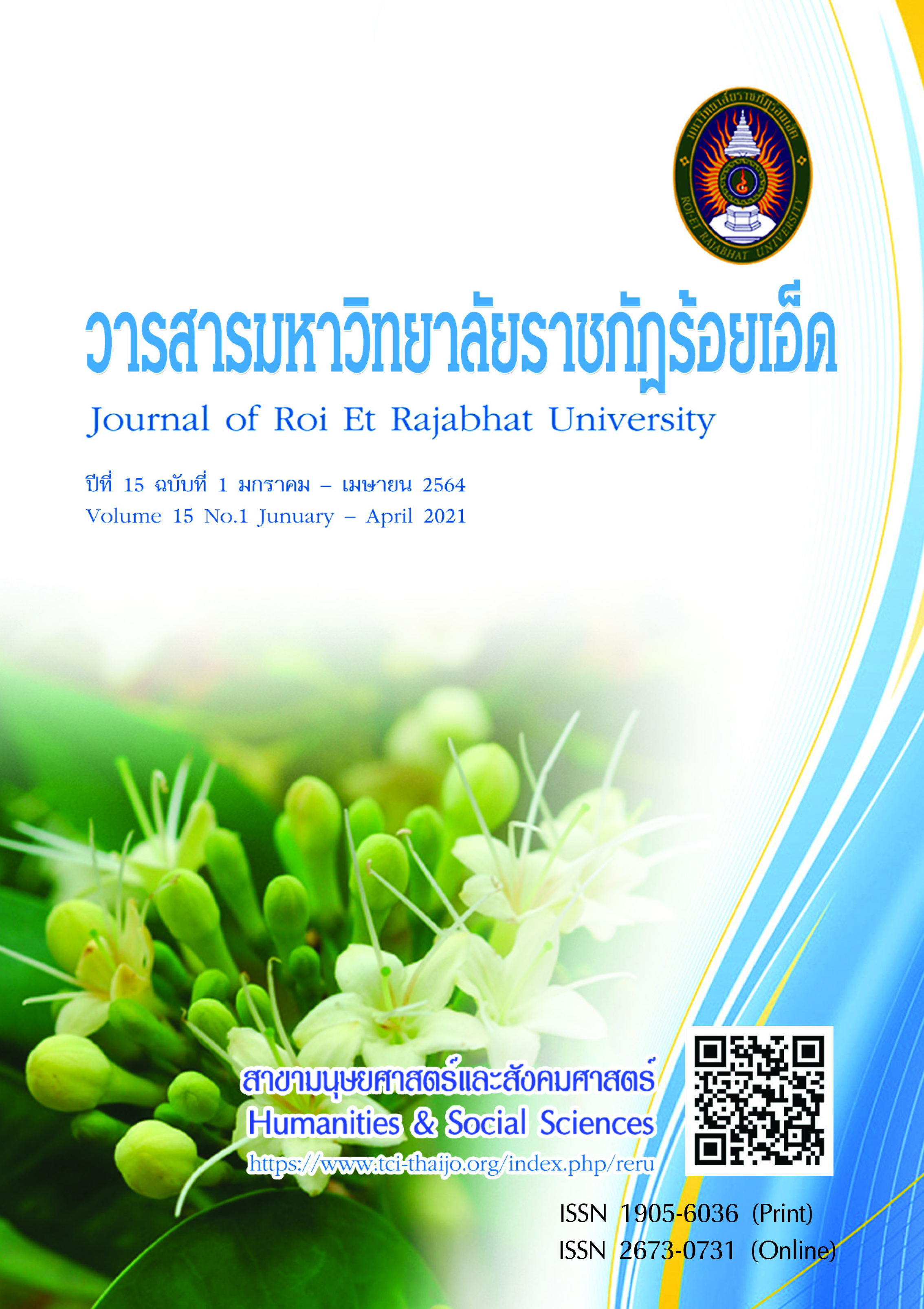Organizational Factors and Development of Learning Skills in the 21st Century for Students of the Faculty of Education, Nakhon Phanom University
Keywords:
Organizational factors, Learning skills in the 21st century, Nakhon Phanom UniversityAbstract
The purposes of this research were 1) to study levels of students’ and teachers’ opinions towards organizational factors and development of learning skills in the 21st century, 2) to study relationship between organizational factors and development of learning skills in the 21st century, and 3) to investigate organizational factors predicting the development of student learning skills for the 21st century in Faculty of Education, Nakhon Phanom University. The sample consisted of 390 faculty members and students of the Faculty of Education, Nakhon Phanom University which was determined from Krejcie and Morgan’s table of sample-size. And the participants were selected by stratified random sampling. The instruments used to collect data were two five-point rating scale questionnaires namely, 1) an organizational factor questionnaire with item discrimination index between .23 - .71, and the reliability of .97, 2) a development of learning skills in the 21st century questionnaire with item discrimination index between .71 - .92, and the reliability of .99. The statistics used to analyze the data were percentage, mean, standard deviation, simple correlation coefficient, and stepwise multiple regression analysis. The results were found that 1) the opinions of students and faculty members towards the organizational factors and development of learning skills in the 21st century was at a high level. 2) The organizational factors revealed a positive correlation with the development of learning skills in the 21st century at .01 level of statistical significance. 3) The organizational factors which could predict the development of learning skills in the 21st century consisted of 7 factors namely, technology, politics and law, management styles, personnel, sociocultural factors, skills and knowledge, and shared values. These factors could mutually predict at 79 % for the development of student learning skills in the 21st century of the Faculty of Education, Nakhon Phanom University.
References
บุญชม ศรีสะอาด. (2553). การวิจัยเบื้องต้น ฉบับปรับปรุงใหม่. กรุงเทพฯ: สุวีริยาสาส์น.
พรรณทิภา คำพรหม. (2551). ปัจจัยที่ส่งผลต่อทักษะการเรียนรู้ของนิสิตนักศึกษาคณะครุศาสตร์ ศึกษาศาสตร์ : การวิเคราะห์ถดถอยแบบกำหนดลำดับขั้น. กรุงเทพฯ: โรงพิมพ์แห่งจุฬาลงกรณ์มหาวิทยาลัย.
ไพฑูรย์ สินลารัตน์. (2557). ทักษะแห่งศตวรรษที่ 21 ต้องก้าวให้พ้นกับดักของตะวันตก. กรุงเทพฯ: มหาวิทยาลัยธุรกิจบัณฑิต.
วารี ชมชื่น. (2559). กลยุทธ์การดำเนินการพัฒนาทักษะการเรียนรู้ในศตวรรษที่ 21 ของนักเรียนโรงเรียนมัธยมศึกษา สังกัดสำนักงานเขตพื้นที่การศึกษามัธยมศึกษา เขต 4. ดุษฎีนิพนธ์ ปรัชญาดุษฎีบัณฑิต สาขาวิชาวิชายุทธศาสตร์การบริหารและการพัฒนา. กำแพงเพชร: มหาวิทยาลัยราชภัฏกำแพงเพชร.
วิจารณ์ พานิช. (2556). การสร้างการเรียนรู้ในศตวรรษที่ 21. กรุงเทพฯ: ส.เจริญการพิมพ์.
สุธร วงค์แดง, ภานุมาส เศรษฐจันทร์ และวีระพงษ์ สิงห์ครุฑ. (2556). การพัฒนาหลักสูตรฝึกอบรมเพื่อเสริมสร้างทักษะการเรียนรู้ในศตวรรษที่ 21 สำหรับนักศึกษาครู มหาวิทยาลัยราชภัฏกลุ่มรัตนโกสินทร. วารสารวิชาการและวิจัยสังคมศาสตร์, 13(37), 75-90.
สุภาพ เต็มรัตน์. (2550). ปัจจัยที่ส่งต่อพฤติกรรมการสอนที่เน้นผู้เรียนเป็นสำคัญของครู สังกัดสำนักงานคณะกรรมการการศึกษาขั้นพื้นฐานเขตภาคใต้ตอนบน. ดุษฎีนิพนธ์ ปรัชญาดุษฎีบัณฑิต สาขาวิชาการวิจัยการศึกษา. กรุงเทพฯ: มหาวิทยาลัยรามคำแหง.
สุทธิพร จิตต์มิตรภาพ. (2553). การเปลี่ยนแปลงโลกของการเรียนรู้ในศตวรรษที่ 21 และการพัฒนาสู่ครูมืออาชีพ. กรุงเทพฯ: สำนักงานคณะกรรมการการอุดมศึกษา.
อรัญญา ชนะเพีย. (2559). รูปแบบความสัมพันธ์เชิงสาเหตุของปัจจัยทางการบริหารที่ส่งผลต่อคุณภาพผู้เรียนในโรงเรียน สังกัดสำนักงานเขตพื้นที่การศึกษาประถมศึกษา ในภาคตะวันออกเฉียงเหนือ. วารสารมหาวิทยาลัยนครพนม, 6(3), 50-58.
เอกชัย พุทธสอน. (2556). แนวโน้มการเสริมสร้างทักษะการจัดการเรียนรู้ในศตวรรษที่ 21 สำหรับนักศึกษาผู้ใหญ่. วิทยานิพนธ์ ครุศาสตรมหาบัณฑิต สาขาวิชาการศึกษานอกระบบโรงเรียน. กรุงเทพฯ: จุฬาลงกรณ์มหาวิทยาลัย.
Izzo, M.V., Yurick, A., Nagaraja, H.N. and Novak, J.A. (2010). Effects of a 21st Century Curriculum on Students Information Technology and Transition Skills. Career Development and Transition for Exceptional Individuals, 33(2), 95-105.
Kay, K. (2010). Twenty-First Century Students Need 21st Century Skills. U.S.A.: Springer Science.
Robles, O. and Maric, A.C. (2012). Cyber Portfolio: The Innovative Menu for 21st Century Technology. Psychology Research, 2(3), 143-150.
Choo, S. (2011). An Analysis of Informations’ Curriculum from the Perspective of 21st Century Skills and Computational Thingking. Instistute of Computer Educational Journal, 14(6), 12-19.
Waterman, R., Peters, J. and Phillips, R. (1980). Management Frameworks. Business Horizons, 23(3), 14-26.
Downloads
Published
How to Cite
Issue
Section
License
บทความที่ได้รับการตีพิมพ์เป็นลิขสิทธิ์ของวารสารมหาวิทยาลัยราชภัฎร้อยเอ็ด
ข้อความที่ปรากฏในบทความแต่ละเรื่องในวารสารวิชาการเล่มนี้เป็นความคิดเห็นส่วนตัวของผู้เขียนแต่ละท่านไม่เกี่ยวข้องกับมหาวิทยาลัยราชภัฎร้อยเอ็ด และคณาจารย์ท่านอื่นๆในมหาวิทยาลัยฯ แต่อย่างใด ความรับผิดชอบองค์ประกอบทั้งหมดของบทความแต่ละเรื่องเป็นของผู้เขียนแต่ละท่าน หากมีความผิดพลาดใดๆ ผู้เขียนแต่ละท่านจะรับผิดชอบบทความของตนเองแต่ผู้เดียว





